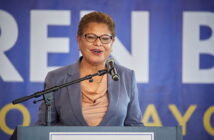By Megan Sayles
AFRO Business Writer
msayles@afro.com
Towson University’s Dr. Nancy Grasmick Leadership Institute hosted a free workshop entitled “Cultivating a Vibrant and Winning Workplace Culture” on Dec. 6 for professionals who have an impact on their workplace’s culture. Executive Director Erin Moran led a panel discussion with Julie East, vice president of talent and human resources for the Atlas Restaurant Group (Atlas); Frank Kelly, CEO of Kelly Benefits; and Frances “Toni” Draper, publisher of the AFRO.
Employers across the U.S. are grappling with a talent shortage. A recent survey from the ManpowerGroup discovered that 77 percent of companies are having trouble filling open roles. The workshop sought to arm participants with strategies for building trust within their organizations, a key driver in reducing turnover and attracting talent.
“A vibrant and winning workplace culture is an environment where employees are inspired and invested in to contribute their authentic selves in service of a shared goal that yields financial and emotional prosperity for all stakeholders,” said Moran.
She opened the discussion by asking the panelists to share their definition of workplace culture. Draper described it as the ethos of an organization and emphasized that every workplace culture is different. East added that it includes shared behaviors and styles of working.
“Corporate culture, in my opinion, refers to the values, beliefs and practices associated with a particular organization and, ultimately, why you do what you do. Every team, group, family, organization and business has a culture,” said Kelly. “All cultures evolve organically to some measurement, and some can be shaped with intentionality.”
“A vibrant and winning workplace culture is an environment where employees are inspired and invested in to contribute their authentic selves in service of a shared goal that yields financial and emotional prosperity for all stakeholders.”
Each of the panelists represented different-sized organizations. Draper said her newsroom consists of about 46 people, while Kelly and East’s companies are larger. Kelly Benefits employs nearly 500 people, and Atlas has more than 2,000 people working across its 28 restaurants.
The panelists provided tips on how they develop their organizations’ leaders to engender proficient performance from their employees that aligns with their workplaces’ values.
East shared an example in practice.
“We discovered a couple years ago that we had spent so much time focusing on the hospitality for guests, that we had actually neglected showing that same hospitality to our employees. It became a big initiative for us as an executive leadership team to ensure that the projects and initiatives we were putting out were focused on making the employees feel values,” said East. “One of the ways we did that was by focusing on each of the leadership teams within a restaurant.”
Atlas’ leadership teams used the DiSC assessment, a personality test that helps people to understand their behavior in the workplace. In understanding their own management styles, the leaders are more effective in communicating, conflict resolution and fostering stronger working relationships.
Draper noted that she focuses on leading by example, saying that she aims to live out the core values of her media company everyday.
“If the CEO does not mirror the values that the human resources person told you the company stands for, there is a disconnect. Most people can tell when it’s phony. They can tell when you’re just putting on,” said Draper. “You have to be genuine with people.”
The panelists closed the conversation by providing advice for creating a vibrant and winning workplace culture. Each of them mentioned the importance of intentionality in building organizations’ culture.
East suggested establishing a baseline through pulse or engagement surveys to discern how workplace culture is viewed by employees. This allows organizations to track their progress in achieving the culture they desire.
Kelly advocated for looking to other like-minded organizations for ways to improve workplace culture.
“Don’t be afraid to take good ideas from other businesses and people you respect. I know for me, I’m not the best at inventing the wheel or reinventing it,” said Kelly. “I like to learn from others, and I would encourage you to go and learn from others in your industry.”
Megan Sayles is a Report for America corps member.



